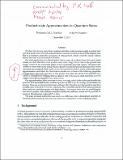Product-State Approximations to Quantum States
Author(s)
Brandão, Fernando G. S. L.; Harrow, Aram W
Download220_2016_2575_ReferencePDF.pdf (7.699Mb)
OPEN_ACCESS_POLICY
Open Access Policy
Creative Commons Attribution-Noncommercial-Share Alike
Terms of use
Metadata
Show full item recordAbstract
We show that for any many-body quantum state there exists an unentangled quantum state such that most of the two-body reduced density matrices are close to those of the original state. This is a statement about the monogamy of entanglement, which cannot be shared without limit in the same way as classical correlation. Our main application is to Hamiltonians that are sums of two-body terms. For such Hamiltonians we show that there exist product states with energy that is close to the ground-state energy whenever the interaction graph of the Hamiltonian has high degree. This proves the validity of mean-field theory and gives an explicitly bounded approximation error. If we allow states that are entangled within small clusters of systems but product across clusters then good approximations exist when the Hamiltonian satisfies one or more of the following properties: (1) high degree, (2) small expansion, or (3) a ground state where the blocks in the partition have sublinear entanglement. Previously this was known only in the case of small expansion or in the regime where the entanglement was close to zero. Our approximations allow an extensive error in energy, which is the scale considered by the quantum PCP (probabilistically checkable proof) and NLTS (no low-energy trivial-state) conjectures. Thus our results put restrictions on the possible Hamiltonians that could be used for a possible proof of the qPCP or NLTS conjectures. By contrast the classical PCP constructions are often based on constraint graphs with high degree. Likewise we show that the parallel repetition that is possible with classical constraint satisfaction problems cannot also be possible for quantum Hamiltonians, unless qPCP is false. The main technical tool behind our results is a collection of new classical and quantum de Finetti theorems which do not make any symmetry assumptions on the underlying states.
Date issued
2016-01Department
Massachusetts Institute of Technology. Center for Theoretical Physics; Massachusetts Institute of Technology. Department of PhysicsJournal
Communications in Mathematical Physics
Publisher
Springer Berlin Heidelberg
Citation
Brandão, Fernando G. S. L., and Aram W. Harrow. “Product-State Approximations to Quantum States.” Communications in Mathematical Physics 342, no. 1 (January 23, 2016): 47–80.
Version: Author's final manuscript
ISSN
0010-3616
1432-0916